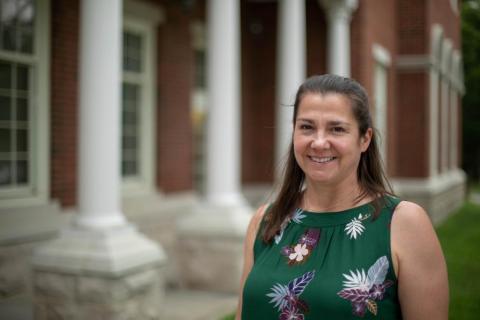
LEXINGTON, Ky. (April 9, 2025) — Last fall, the University of Kentucky Office of the Provost announced the second cohort of the Institutional Multidisciplinary Paradigm to Accelerate Collaboration and Transformation Awards winners.
The IMPACT Awards initiative, an internal funding program from the Office of the Provost, launched in 2023 to support innovation and transformation within UK’s colleges. The awards recognize the groundbreaking work conducted by faculty and staff across campus, and they create opportunities for transdisciplinary collaboration to occur between UK community members to help the university’s mission of advancing Kentucky.
This spring, UKNow is highlighting the 2024-25 IMPACT Award projects and the faculty who are leading them. In total, 15 colleges, including UK Libraries and the Graduate School, are working collectively to break new ground on ways to advance the state.
The project titled “Language and Home in the Commonwealth" how Kentuckians have talked about and lived in their homes over the past century.
The team is led by Allison Burkette, professor and chair of the Department of Linguistics in the College of Arts and Sciences, and Patrick Lee Lucas, a professor in the College of Design’s School of Interiors. Team members also include, Kerry Brown, with the College of Design; Noah Nolan, a student in the College of Design; and Kathryn Copeland, Samuel Aboud, Elliot Trainor, Jules Blank and Olivia Marquardt — all from the College of Arts and Sciences.
By looking at houses and furnishings, they are revealing the ways in which meaning is created within a home’s cultural spaces. According to the team, the study of home spaces and the words we use to talk about them helps us more clearly understand Kentuckians’ experiences and how they have developed and changed over the past century.
How has the IMPACT award inspired innovation at UK with your research?
The grant allowed us to build a small team of student researchers to dig into Kentucky’s unique identity as a cultural crossroads. By looking at houses, furniture and the words people use to describe them, we’re uncovering how Kentuckians have shaped their communities — and how that continues today.
How did you decide on this particular topic or research area?
We’ve always been fascinated by the everyday objects and words that tell the story of a place. Kentucky is especially interesting because it sits at the intersection of several cultural traditions — including from New England, the Mid-Atlantic and the South. That mix is reflected in the homes and furnishings across the state. We’re working with museums and historical organizations to bring these stories together and help paint a fuller picture of Kentucky’s past, present and future.
What positive impact will your research have on Kentucky and beyond?
Our goal is to challenge outdated stereotypes about Kentucky — like the idea that people here only live in log cabins or mobile homes. In reality, Kentucky homes have always reflected a rich mix of styles and social classes. Even modest rural homes might have a fancy heirloom or prized object. One has always been able to find “fancy” goods in rustic structures, even if those goods had local names (such as the term “firedogs” for a set of brass andirons). In demonstrating this, “Language and Home in the Commonwealth” will help dispel assumptions about Kentucky by highlighting Kentucky’s diversity and cultural depth.
What comes next for your research?
We’re creating a virtual exhibit that will bring together photos, stories and maps showing how Kentuckians have described their homes across time. Visitors will be able to explore different house styles and local terms by region, social class and time period — from the 1940s to today. Since the Language and Home exhibit will be online, we can share it widely with communities across the state through libraries, museums and education programs.
